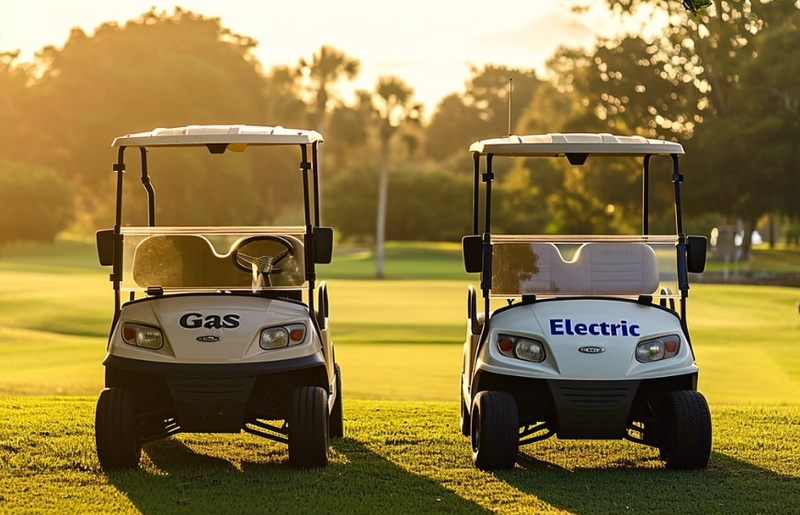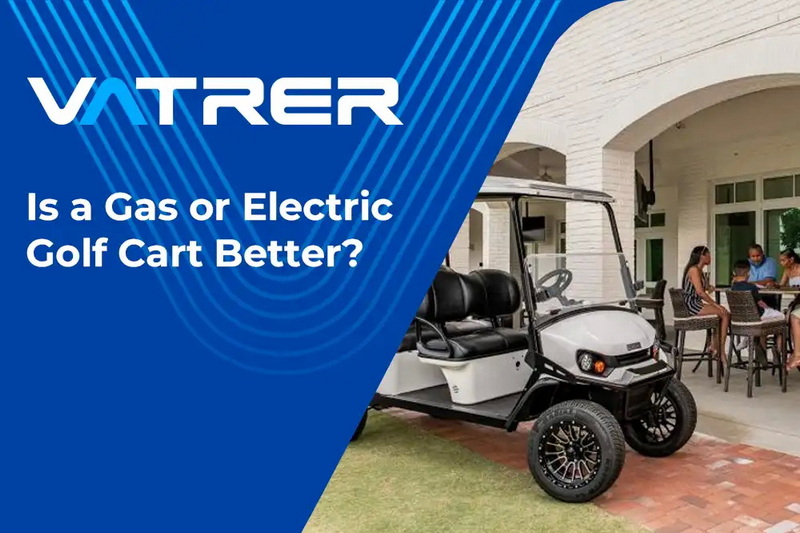Content Menu
● Understanding Golf Carts
● Key Differences Between Gas and Electric Golf Carts
>> Performance
>> Maintenance
>> Environmental Impact
>> Cost Considerations
● Pros and Cons of Gas vs. Electric Golf Carts
● Factors to Consider When Choosing
● Ride Comfort and Experience
>> Electric Carts:
>> Gas Carts:
● Additional Considerations
>> Battery Technology Advancements
>> Fuel Efficiency
>> Customization Options
● Conclusion
● Frequently Asked Questions (FAQ)
>> 1. What is the average lifespan of an electric golf cart battery?
>> 2. Can I use an electric golf cart on hilly terrain?
>> 3. How long does it take to charge an electric golf cart?
>> 4. Are gas golf carts more powerful than electric ones?
>> 5. What are the operating costs associated with each type of golf cart?
When considering the purchase of a golf cart, one of the most significant decisions revolves around whether to choose a gas or electric model. Each type has its unique advantages and disadvantages, making it essential to evaluate your specific needs, preferences, and intended use. This article delves into the key factors to consider when choosing between gas and electric golf carts, providing a comprehensive overview to help you make an informed decision.

Understanding Golf Carts
Golf carts are compact vehicles designed primarily for transporting golfers and their equipment around a golf course. However, their utility has expanded over the years, with many people using them for various purposes, including neighborhood travel, farming, and recreational activities.
Key Differences Between Gas and Electric Golf Carts
The fundamental difference between gas and electric golf carts lies in their power source. Gas carts are powered by gasoline engines, while electric carts rely on rechargeable batteries. This distinction leads to various implications regarding performance, maintenance, environmental impact, and cost.
Performance
- Gas Golf Carts:
- Generally offer higher top speeds (up to 25 mph) and can maintain speed over longer distances.
- Better suited for hilly terrains due to their horsepower (typically 10-15 HP).
- Can travel approximately 100-200 miles on a single tank of gas.
- Electric Golf Carts:
- Provide quick acceleration with instant torque but typically have lower top speeds (around 15-20 mph).
- The range on a full charge varies between 20-40 miles depending on battery type (lead-acid vs. lithium-ion).
Maintenance
- Gas Golf Carts:
- Require regular maintenance such as oil changes, air filter replacements, and spark plug checks.
- More complex mechanical systems can lead to higher repair costs over time.
- Electric Golf Carts:
- Generally require less maintenance due to fewer moving parts.
- Battery maintenance is crucial; lead-acid batteries usually last 2-5 years while lithium-ion batteries can last up to 20 years with proper care.
Environmental Impact
- Gas Golf Carts:
- Produce emissions that contribute to air pollution and are less environmentally friendly.
- Electric Golf Carts:
- Produce zero emissions during operation, making them a greener choice.
Cost Considerations
- Initial Purchase Price:
- Gas golf carts tend to have a lower initial purchase price compared to electric models.
- Operating Costs:
- Gasoline costs can accumulate over time, while electric carts incur electricity costs for charging.
- Resale Value:
- Gas carts often have a higher resale value due to their longevity and demand in certain markets.

Pros and Cons of Gas vs. Electric Golf Carts
| Aspect | Gas Golf Carts | Electric Golf Carts |
| Performance | Higher speed & range | Quick acceleration & torque |
| Maintenance | More frequent & complex | Less frequent & simpler |
| Environmental Impact | Emits pollutants | Zero emissions |
| Cost | Lower initial cost | Higher initial cost, cheaper operation |
| Noise Level | Noisier | Quieter operation |
Factors to Consider When Choosing
When deciding between a gas or electric golf cart, consider the following factors:
1. Usage: Determine how you plan to use the cart. For frequent long-distance travel or hilly terrains, gas may be preferable. If you plan on short trips around the neighborhood or golf course, an electric cart may suffice.
2. Maintenance Preferences: If you prefer low-maintenance options, electric carts might be more appealing due to their simpler mechanics.
3. Environmental Concerns: If reducing your carbon footprint is a priority, electric carts are the clear winner.
4. Budget: Consider both initial purchase price and long-term operating costs. While gas carts may be cheaper upfront, ongoing fuel costs can add up.
5. Noise Sensitivity: If noise is a concern (e.g., in residential areas), electric carts offer a quieter ride.
Ride Comfort and Experience
Electric Carts:
Electric golf carts tend to offer a quieter, smoother ride, enhancing the comfort level for passengers. The silent operation makes them suitable for environments where noise is a concern, such as residential areas or during early morning rounds of golf when players want minimal disturbances.
Gas Carts:
While newer models have become quieter over the years, gas-powered carts still produce engine noise that may be bothersome in quiet settings. Some users appreciate the traditional feel of driving a gas-powered vehicle; however, this comes at the cost of increased noise levels and potential vibrations from the engine.

Additional Considerations
Battery Technology Advancements
Recent advancements in battery technology have significantly improved the performance and range of electric golf carts. Lithium-ion batteries are now available in many new models, offering longer life spans and faster charging times compared to traditional lead-acid batteries. This innovation has made electric carts more competitive in terms of range and efficiency.
Fuel Efficiency
Gas golf carts typically require refueling every few hundred miles depending on usage patterns. In contrast, electric carts can be charged at home using standard electrical outlets, making them more convenient for daily use. The cost of electricity for charging is generally lower than gasoline prices per mile traveled.
Customization Options
Both gas and electric golf carts offer various customization options including seating arrangements, storage solutions, paint jobs, and accessories like coolers or sound systems. However, customization for gas models may involve more mechanical work due to their complex systems compared to the straightforward modifications possible with electric models.
Conclusion
Ultimately, the decision between purchasing a gas or electric golf cart depends on your individual preferences and needs. Both options have distinct advantages that cater to different lifestyles and usage scenarios. By carefully assessing your requirements—considering factors such as performance, maintenance, environmental impact, cost, intended use, ride comfort, battery technology advancements, fuel efficiency, and customization—you can make an informed choice that best suits your lifestyle.

Frequently Asked Questions (FAQ)
1. What is the average lifespan of an electric golf cart battery?
Electric golf cart batteries typically last between 2-5 years for lead-acid batteries and up to 20 years for lithium-ion batteries with proper maintenance.
2. Can I use an electric golf cart on hilly terrain?
While electric carts can handle moderate hills well due to their torque capabilities for acceleration, they may struggle on steep inclines compared to gas carts which have more horsepower.
3. How long does it take to charge an electric golf cart?
Charging times vary but generally range from 8 to 14 hours depending on the battery type and charger used.
4. Are gas golf carts more powerful than electric ones?
Yes, gas golf carts typically have higher horsepower (10-15 HP) compared to electric models (3-5 HP), making them better suited for heavy loads and hilly terrains.
5. What are the operating costs associated with each type of golf cart?
Operating costs for gas carts include fuel expenses and regular maintenance; for electric carts, costs include electricity for charging and potential battery replacement expenses.











































